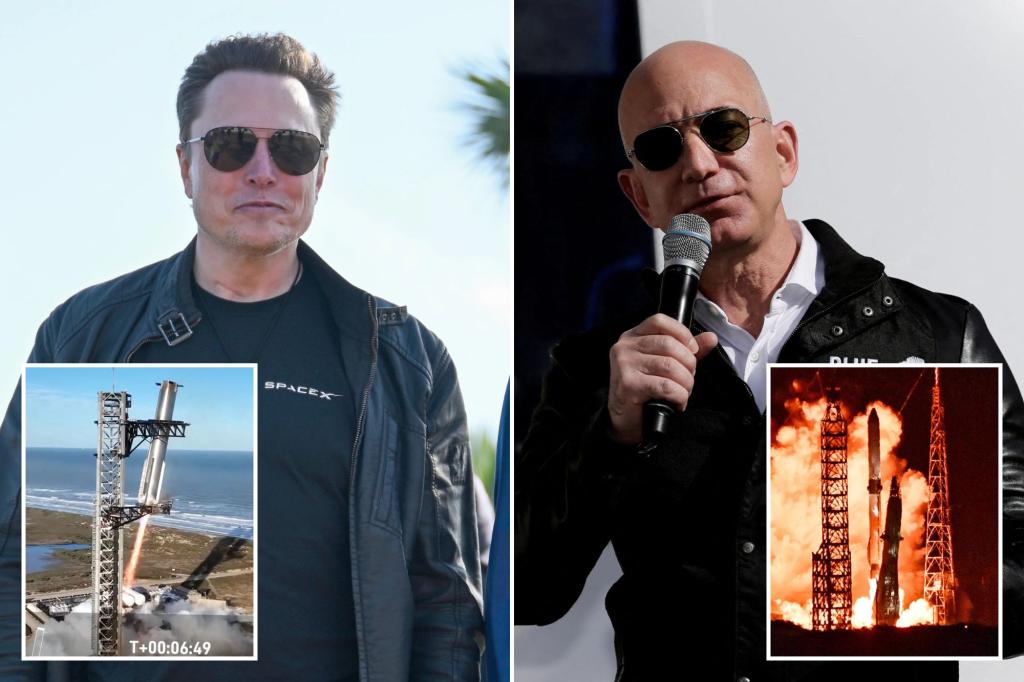The dawn of a new space race commenced in the pre-dawn hours of a Thursday morning, not between nations this time, but between two titans of industry: Jeff Bezos and Elon Musk. Bezos, the world’s second-richest individual, marked a significant milestone with the successful launch of Blue Origin’s New Glenn rocket, a towering 320-foot vessel designed for orbital payload delivery. This achievement distinguished Blue Origin as the first company to accomplish orbit on an inaugural launch of this scale. Hours later, Musk, the world’s wealthiest individual and founder of SpaceX, countered with the launch of his Starship rocket from the Texas-based Starbase facility, intensifying the rivalry between the two billionaires. While both launches were deemed successful, neither fully achieved all intended objectives. Blue Origin’s attempt to land the rocket booster on an Atlantic barge failed, while SpaceX successfully returned its Super Heavy booster but lost the Starship craft in space.
The competition between Bezos and Musk, both described as driven by ambition, is palpable, with Musk currently holding a substantial lead in launch frequency. SpaceX boasts a staggering 138 launches in 2024 compared to Blue Origin’s four. While acknowledging the significant ground to cover, industry experts recognize Blue Origin’s orbital achievement as a legitimizing step, positioning them as a serious contender in the commercial space arena. Despite the fierce competition, a surprising undercurrent of mutual respect emerged. Musk, known for his bold predictions, publicly congratulated Bezos on the successful launch, hinting at a thawing in their previously frosty relationship. The financial stakes in this new space race are astronomical. Blue Origin’s New Glenn project has reportedly cost over $2.5 billion, with each launch carrying a price tag of approximately $68 million. SpaceX’s Falcon Heavy launches also demand a hefty sum of around $90 million per mission. However, the potential rewards are equally significant, with a burgeoning market for satellite deployment and other space-based services offering lucrative opportunities for both companies.
Both SpaceX and Blue Origin aim to capitalize on the lucrative business of transporting heavy payloads, including satellites, into orbit. The demand for such services is sky-high, with a backlog of satellites awaiting launch. Despite the high costs associated with rocket development and launch operations, the potential profits in this emerging market are substantial, driving the competition between these two space giants. This rivalry is not simply about personal ambition or financial gain; it is also about shaping the future of space exploration and commercialization. Both Bezos and Musk harbor grand visions of expanding human presence in space, albeit with different focuses.
Intriguingly, the rivalry between the two billionaires appears tempered by a growing camaraderie, particularly in their alignment with the incoming Trump administration. Both Musk and Bezos have cultivated relationships with Trump, leading to speculation about their joint influence on future space policy. Musk, in particular, has been appointed to a prominent role within the administration, further fueling speculation about his potential leverage in securing government contracts for SpaceX. This newfound alliance, while seemingly unexpected, highlights the evolving dynamics of the space industry and the intersection of private enterprise and government interests.
The competition between SpaceX and Blue Origin extends beyond just launch capabilities; it also encompasses the pursuit of lucrative government contracts, particularly with NASA. The two companies frequently vie for the same contracts, often leading to legal disputes, as exemplified by Blue Origin’s unsuccessful lawsuit against NASA for awarding a lunar lander contract to SpaceX. This intense competition reflects the high stakes involved in securing government funding and the strategic importance of these contracts for the long-term viability of both companies. Despite the rivalry, some observers believe that the dominance of SpaceX and the shared ambition of both companies to advance space exploration may lead to a more cooperative approach. Others, however, predict a more cutthroat competition, particularly given Musk’s close ties to the new administration.
While the two companies compete fiercely, industry experts point to a commonality of purpose: both Bezos and Musk envision a future where humanity has a significant presence in space. Musk’s ultimate goal is to colonize Mars, while Bezos envisions a future with billions of people living and working in space. These grand visions, while seemingly fantastical, are driving innovation and investment in the space sector, ultimately benefiting not only their respective companies but also the broader scientific community and potentially all of humankind. The race between Musk and Bezos is ultimately pushing the boundaries of space exploration, accelerating the timeline for achieving these ambitious goals.
The emergence of these two powerful players in the commercial space industry represents a significant shift from the previous era of government-led space exploration. The injection of private capital and entrepreneurial spirit has revitalized the US space program, transforming it from a stagnant entity into a dynamic and globally competitive force. The rivalry between SpaceX and Blue Origin, while driven by personal ambition and commercial interests, has undoubtedly spurred innovation and accelerated the pace of space exploration, positioning the United States as a leader in this burgeoning field. The world watches with anticipation as these two billionaires continue their race to the stars, shaping the future of human presence in space.

